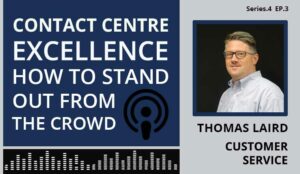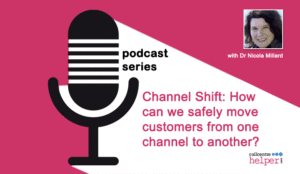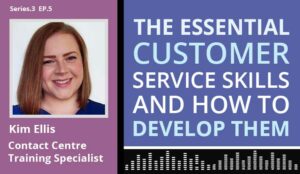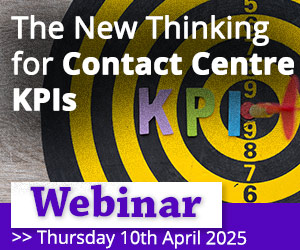The Contact Centre Podcast: Series 3 Episode 1
In this episode, Jo Hale, a greatly experienced Customer Contact Director, shares great insights into overcoming those common challenges that we all face when managing the contact centre.

As part of our discussion, we also share expert tips to improve communication across the contact centre, secure more budget and lower attrition, as well as much more.
To listen to the podcast directly from this web page, just hit the play button below:
The Contact Centre Podcast – Episode 13:
Top Contact Centre Problems And How To Solve Them
This podcast was made possible by our sponsor, Genesys. We now have a new link to visit their website, instead of the link mentioned in the podcast to request a demo.
So, to find out more about Genesys, simply visit their website
Podcast Time Stamps
- 1:56 – New-Age Contact Centre Problems
- 4:25 – Gaining Budget and More Resources
- 8:10 – Combatting Attrition
- 13:48 – The Importance of Culture
- 16:27 – Contact Centre Management Problems
- 20:26 – Prioritizing Advisor Development
Here is a Transcript to the Podcast
Charlie Mitchell: So are there any problems that contact centres now face which maybe they wouldn’t have five years ago or 10 years ago?
Jo Hale: I think the major thing is it’s a lot more complex than it used to be. So they’re the same sort of problems, the same fundamentals, which are cost, budget, a bit about people, how do you keep them? And then there’s also the bit of the minefield that becomes technology. So I think that the same fundamental issues, or opportunities, as you might call them.
But I think the challenge is more, there is so much complexity in how you fix them or can fix them. And I also think there’s so much wider opportunity to use technology for different things. When I started a long time ago, there wasn’t many options apart from to remove staff by making the processes easier. Now you have to do that, plus you have to do something onto the web or link the technology together. So there’s far more complexity than there was five years ago. But I think the fundamentals are exactly the same challenges.
Charlie: It’s definitely changing a little bit. As you mentioned there, the integrations between the technologies and things are really starting to come to the fore. But one thing I particularly found quite interesting was that handling times, in recent research that we’ve done, are getting longer and longer, which suggests that self-service is taking more and more of those kinds of easy causes and making the advisor role harder. Do you think this might become a problem for contact centres over time?
Jo: I think it really depends how they adjust to that. And that’s where the complexity starts to come in, isn’t it? So if your handle times are longer, that would suggest that you are absolutely having to do more on the phone. But it could be as simple as the journey that you’ve put online or the self-serve opportunity that you’ve put in isn’t quite working, so it’s actually not resolving the challenges that customers are having.
So I think the thing about the handle time, now I read your recent survey, I think it’s really important to understand why that is, and is it just down to the complexity that’s coming into your centre as a result of the customer need because your journey isn’t working correctly.
So I think there’s a bit of work to be done to unpick that handle time and what’s driving it.
Charlie: Absolutely. I think that’s a very key point and that the drivers will vary from one organization to another.
To go to the next point I wanted to cover, which was that due to another piece of call centre research – I like getting that in there – is that obtaining more budget is becoming the biggest problem that contact centre managers face. Do you have any advice for asking for more resources for the contact centre?
Jo: My personal view is you have to come back a little bit from that. So the first thing I think you need to understand is what type of business do you want for your call centre? So has your call centre got to be world-class? What’s the critical act of it? Because actually it could be that as a business, you just don’t have the money to spend on the technology that you need.
So I think the first thing you need to understand is what does your business want from your call centre? So does it want it to be world-class? Does it want it to be good? I’ve had a number of conversations with CEOs or whatever to say, “Well, what do you want your customers, the service you want them to receive?” And a lot will come back and say, “World-class.” I say, “Okay, well world-class costs.” Yeah. And actually, does a customer want world-class?
So I think you need to understand in the bigger spectrum what your business wants. And then I think there are some questions you need to ask before we even go to the money piece, which is what impact if I got that budget, would it have on the businesses growth? And can I show that? So if you build a business case for it, make sure you involve your finance VP or whoever you work with to understand what’s the measures of success.
And then the other side of that is if we don’t spend any more money, what does that mean for the business? And actually show both of those things. And then also, there’s something about why do you need it? Is it regulatory, is it to give a better service? Is it for growth or is it just nice to have? Or do you need to update these systems because they going to crash? Whatever it is.
But I think you’ve got to work through each of those questions and then get support from the organization to answer them and get their view and perspective, before you even go to ask for money. So I think it’s important to think about that ‘why’ and what you need before you go there.
Charlie: Yeah, I think there’s lots of great stuff there. You don’t fly Ryanair and expect Emirates service, I think is the line that I heard recently which closely relates to that area well. And I thought the kind of aligning your goals with the organization’s was a particularly key point.
But do you think that many contact centres struggle just to communicate with their other departments? Do you think it’s becoming more and more important for contact centres to branch out more and improve their ties with other parts of the business?
Jo: I think you have to. I think that’s a real fundamental piece of working as a team and within the organization. You are, in many cases, the only people that will speak to the customer. Therefore, you have a critical role in the organization, and it’s getting those relationships together, understanding the why. Why is it critical for me to spend money? What will that give us? And what will that mean for the rest of the organization is really important.
Before you even get to the point where you’re going to ask for money, put some thoughts into the background of why you want it. And actually be really prepared because there’s many times people come back and say no because there isn’t the money there, or there’s a situation which means that you can’t have money right now, so you have to be prepared to do that as well.
Charlie: Sure. I think that’s a very key point there. What will it mean for other parts of the organization is particularly key there. And just moving on now to the next question that I want to ask, and that’s all about attrition, which is a common issue that many contact centres face even more, and more so now with the new generations actively expecting to hop from one job to the next. But how do you think that contact centres can now combat this issue?
Jo: I would look at three major things. How the business attracts you, the person that you’ve recruited. Do they engage them, do they understand why their role is important and do they understand what part they play in the future?
Then I think there’s something around the manager, your manager. So you spend most of your day in your call centre as an agent dealing with your manager and the team around you. That’s really critical for you. So understanding are they being supported? Are they developing them? Are they saying thank you? Are they being positive? All those sorts of things that engage with you and the team.
And then the final piece is actually as an agent, what does an agent feel? So is there opportunity for that agent to grow within your organization? And are they being motivated to do a role? So I think if in the attrition, if you imagine it like a triangle, if you thought about how it works as a company, how it works with their manager and how it works for them, then you’ve got a fighting chance of hopefully supporting and keeping that attrition low.
Charlie: One key point that I’ve noticed, particularly in contact centres, is creating those relationships between team leaders and the advisors. And one thing that many contact centres don’t do is have advisors working the same shifts as their team leaders.
Jo: Yeah. And that’s a really hard thing to do. Having worked in call centre sites for a long time, team-based scheduling can be challenging from a business perspective. So from a piece of, have I got enough people in at the right time, sometimes, if you’re a smaller centre particularly, team-based scheduling is really difficult to achieve. But there are ways around that with having shift patterns that work around the team, not always together but within a couple of hours, or things like having your team on the early shift all together or a later shift all together within a couple of hours, will help with some of that. But you’re never going to get away from the fact that actually in a smaller centre, a team-based schedule is going to be challenging.
Charlie: I was actually in a contact centre a couple of days ago where one of their things that they did to improve their shift patterns and add flexibility was to have the schedules available in the advisors’ phones, and they can see for themselves whether or not the shift was opt in or opt out for shifts swaps. I thought that was a really good idea. Do you have any more insights as to what contact centres can maybe do to increase that flexibility in their schedules?
Jo: I think there’s things like looking at the resource that you’re bringing in, so the people that you’re hiring, do they all want to work in an earlier shift? Some mums want to go in early or later, and work through that piece. I think the other thing is, is actually being really open and upfront about the shifts that you have and that you can offer and the flexibility.
I’ve seen loads of times the resource planning team are so critical to the success of the centre as a whole. So I think it’s really important that those teams explain to their agents why these things are important. Why do we have these shifts? And what they can and can’t do from a customer perspective and a business perspective. But having that relationship… quite often, all resource planning is done through your line manager. Where I’ve seen it be really successful is where the planning teams and the resourcing teams have also engaged the teams directly.
Charlie: I think a key point is being very open and honest with advisors and engaging them as one way to engage the team with resource planning and telling them about the power of one. Obviously if just one person’s five minutes late, that can impact the rest of the teams. I think that’s another very key point there. I kind of wanted—
Jo: Just on that one, Charlie, I did an exercise a very long time ago where I had my team – I was a team leader at the time – I had my team come in for their shift. But what we did is when they were coming into their shift, instead of them going onto the floor, what we did is we arranged on this day for everybody to come into a training room. So we said that what we were going to do is we were going to take calls in the training room, but actually what I was trying to do is to see how people come to work.
And people who would come in late or having that impact, what impact that has when they come in. So they come in through the door, put their stuff down and sit at their desk. But they’d be late. But other people have been there 10 minutes earlier and were on time. So having that discussion then with them, because it was part of our team meeting. What does that mean? That person’s just come in late. How does that impact you? How does it impact the customer? And that helps hugely if you can explain why it’s important. It’s not you just saying please be on time or please make sure your adherence to schedule’s right. Give it a physical look and what that means to them.
Charlie: That’s a great point. And so kind of giving them the understanding so they can self-manage it instead of having to use a stick to kind of say, “No, you need to be…” Yeah, yeah. I think that’s a great idea.
And it actually moves on nicely to my next point, which was creating a great contact centre culture is key to eradicating many of your problems, like attrition and some of the others that we spoke about already. Is this something that you believe more and more contact centres should spend their time focusing on?
Jo: I think it’s the critical piece. So if your teams are engaged… Gallup do this real data that supports if your team are engaged, they will work harder, be more productive, stay with you longer. All of those things, there’s evidence to support that and engagement is critical.
But again, I come back to these three ways in which you engage. There’s you as your team, because your relationship with your manager is absolutely key. So how do you make sure you have that relationship? There’s you and yourself and how you understand the business. But also there’s the piece around how do you engage in the journey that the business is on. How do you share with your team the strategy, what that means they’re expected to do and what they can expect from you? So that relationship is very important.
In my last role, I spent one afternoon every month with the whole of our leadership team, so at team leader level. And we would spend the afternoon talking about what development, engagement, things about how we were building the budget, all of those things that were really important to them. And that’s a huge commitment taking an afternoon out every month. But the difference that made to them understanding how the business worked, what it meant and how we could engage the teams in that was so important.
You’ll have been to lots of call centres, Charlie, where their one-to-ones are cancelled if they get busy. All of those things happen. Once you start down that slope, it’s very hard to get out of it because the teams need the break off the phone or they want to have a discussion about their development and their career. If you’re too busy for that, then you’re going to lose people and your culture is not going to be set right.
Charlie: Hmm. Yeah, I think that communication, as you said, is so key in setting the right expectations with examples. Those kinds of meetings every month are so good because if people don’t understand that purpose, that’s kind of a key motivator. Motivating agents is a big problem for many contact centres as well. So in your experience, what are the sorts of common problems that contact centre managers often struggle to deal with?
Jo: I think there’s one that is a theme through every call centre you ever go into, which is time.
Charlie: Yeah.
Jo: I think it’s life in general. Over the years, I found it really interesting because I think that time is such a critical part of everything that we do. And I think it’s really important when you’re a manager that you make time.
And what I mean by that is that you plan, you organize, you think about what’s important, you focus on what you need to do when you need to do it at that point, you don’t get distracted, is really critical.
I think the best managers I’ve ever worked with, or worked for, are really good at their time management, really good at their organization, which gives them time to engage with their team properly to understand the situation. So I think time is the critical one.
The other thing I think that’s there is also about just generally people. It can be when you’re new to a team leader role, or at any point during the manager’s role actually, quite challenging to support your team. Sometimes there’s mental health challenges that they may have or they might need extra support. You being able to point them in the right direction takes time, and having that level of skill to support people, well for some people that comes really naturally, there’s always things you can learn doing that, so I think that’s an important part.
And the third thing is just having some of your own development. A team leader role is pretty relentless, in my view. Any role in a call centre at that level, there’s a fundamental that’s right, isn’t it? Every leader that we have in our organizations is paid to produce results. But the only way that you can deliver results is through people. So your leadership makes that difference to them, and you’ve got to make the time to do that. So I think there’s some fundamentals about time, people and development to make sure you can support your people in the right way.
Charlie: Yeah, I think there’s one particular point there that I want to pick up on, and that’s in order to create more time, one thing that I’ve seen a few contact centres do more and more is just trying to limit the amount of time that they’re spending on email and making sure that leaders spend more and more time with their teams.
So they’re introducing maybe community groups so teams can answer each other’s questions and maybe introducing new resource planning measures so that they don’t always have to be the middle man for shift swaps. Are there any other ways that you advise contact centres to improve their communication to advisors?
Jo: I think a real fundamental for me is, I think managers and leaders think they need to know the answers, therefore, they will spend a lot of time making sure they know the answer. And actually they don’t.
I guess of course they need to understand situations, but they don’t have to have the answer. So if you can get your communication to help them find the answer, so having a really good intranet or something that can help them physically type in, “This is the question I have,” and find the answer. Those sorts of things will really give you the time.
I’ve run team meetings where we’ve said, “Right, what’s the questions we’ve asked this week? Okay, let’s everybody share their answers. Are we all singing from the same hymn sheet? Do we know the answer?” And you’ll learn that way, I think, that there’s lots of different ways you do, but I think it’s critical that managers don’t think they have all the answers, because you never do.
Charlie: It can be so difficult to offer advisors progression opportunities and that’s a big problem that people are faced with, because contact centres traditionally have that pyramidal structure of advisors, leaders and managers. What would you advise for helping teams to make a plan for their advisor’s development? Do you think this is something that they aren’t doing often enough?
Jo: I think it depends on the individual, doesn’t it? It’s a very individual thing. Some people, I’ve had teams where they come to work, they just want to do a good job and go home. They’re not actually that interested in developing, and that’s not because they don’t want to, but they’re not interested in it and it’s not for them.
Whereas you’ll have other people in your team that desperately want to develop. You can see they’ve got the appetite for it. You can see that they really want to learn. So it comes back to a real basic, which is understanding and knowing your team. What do they need on an individual basis, not just on the team? Who in your team needs development? Who in the team do you want to keep making sure they have development? What opportunities, what areas do they want to go in?
Not everybody wants to go up through the levels. Some people might actually want to go to a different department. They might want to work in planning, might want to work in training, they might want to do work in the complaints team. There’re all different ways that you can do a piece. The best leaders I’ve ever worked with have, rather than go straight up the levels, they sort of broaden their skill. So I think the fundamental of development is how broad is your skill before you actually move up the levels. Have you got that breadth and depth of knowledge to deliver and achieve what you want to do?
Charlie: Yeah, sure. I think one point that I actually picked up on a recent visit, I used to work very closely with Domestic & General, and one thing that they did there was to remind everyone that they can move sideways. It doesn’t just have to be up and down, but they can move into different teams as well. They would make an effort to help people do that and to discuss to keep their well-being. And again, that would help, I imagine, to improve attrition, as we’ve talked about so much.
But the final kind of problem that I’ve been thinking of actually links up to a point that you made almost at the start of this podcast, was that often a problem for contact centres can be conflicting business priorities across the organization. Sorry, this is moving very quickly from one subject to another. Do you think this is a problem that contact centres face? They don’t really know which are the key things focus on.
Jo: I think you will have a situation where you get that. But I think it’s a two-way conversation that just needs to be had, which is, what is it? What’s the role the call centre plays within your organization? Is it the heart and the centre of what you do or actually is it something that is just transactional and just needs to be well run? I think it’s that discussion you’ve got to be prepared to have first. Why is it important? It can be, in many cases, the only link you have to your customers. Therefore, it’s really important that people understand what your call centre is there to do.
And once you’ve got that, there will be different priorities. An organization will always have different priorities. It’s you understanding where you fit in those priorities and which you can be successful at, because you might not be able to get all the money you want or all the information you want, but what you certainly can do is build within your centre the service that the organization wants you to deliver, because it’s actually only done through people.
Charlie: I think that’s a nice notion as well. We spoke a lot about people today and I think that’s a very nice point to end on. But just for all our listeners, Jo, is there anywhere on social media and stuff that they can follow you to find out even more about your role within the industry and keep up to date with all your latest information?
Jo: So, I’m on LinkedIn and usually I post mostly there. So I’m generally on LinkedIn. Also on Twitter @jo.hale. But LinkedIn is probably the best place.
Charlie: That’s all for this episode. Thank you to Jo Hale for joining us today. But before we go, Jo and I discussed some research into handling times and common barriers to delivering great customer service. This research came from Call Centre Helper’s survey report “What Contact Centres Are Doing Right Now, 2019 Edition”. If you want to give this research a read, you can find the link in the description below. Enjoy.
Author: Jonty Pearce
Reviewed by: Jo Robinson
Published On: 20th Jan 2020 - Last modified: 10th May 2024
Read more about - Podcasts, Charlie Mitchell, Genesys, Jo Hale




































